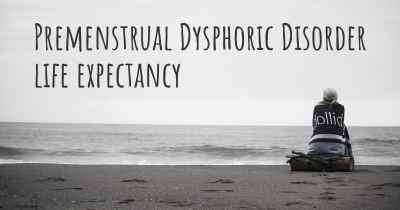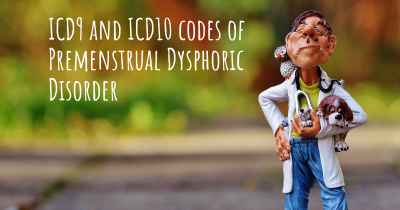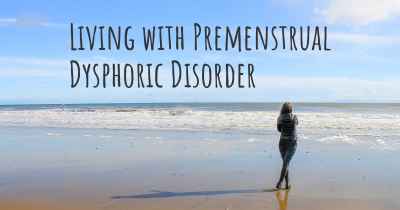Which advice would you give to someone who has just been diagnosed with Premenstrual Dysphoric Disorder?
See some advice from people with experience in Premenstrual Dysphoric Disorder to people who have just been diagnosed with Premenstrual Dysphoric Disorder

Premenstrual Dysphoric Disorder (PMDD) is a condition that affects some individuals who menstruate. It is characterized by severe emotional and physical symptoms that occur in the week or two before the onset of menstruation. If you have recently been diagnosed with PMDD, it is important to remember that you are not alone and that there are ways to manage and alleviate the symptoms. Here are some pieces of advice to help you navigate this condition:
1. Educate Yourself
Take the time to learn about PMDD and understand its symptoms, causes, and treatment options. Knowledge is power, and by understanding the condition, you can better advocate for yourself and make informed decisions about your health.
2. Seek Professional Help
Consult with a healthcare professional who specializes in reproductive health or mental health. They can provide an accurate diagnosis, offer treatment options, and guide you through managing PMDD. Consider reaching out to a gynecologist, psychiatrist, or therapist who has experience in dealing with PMDD.
3. Track Your Symptoms
Keep a detailed record of your symptoms, their severity, and the timing of your menstrual cycle. This can help you identify patterns and anticipate when symptoms may occur. Several mobile apps and online tools are available to assist you in tracking your symptoms conveniently.
4. Develop Coping Strategies
Explore various coping strategies to help manage the emotional and physical symptoms of PMDD. This may include practicing relaxation techniques such as deep breathing exercises, meditation, or yoga. Engaging in regular physical activity, maintaining a balanced diet, and getting enough sleep can also contribute to symptom relief.
5. Consider Medication
If your symptoms are severe and significantly impact your daily life, your healthcare provider may recommend medication options. Selective serotonin reuptake inhibitors (SSRIs) are commonly prescribed to alleviate PMDD symptoms. It is essential to discuss the potential benefits and side effects of medication with your healthcare provider to make an informed decision.
6. Build a Support Network
Reach out to friends, family, or support groups who can provide understanding, empathy, and encouragement. Sharing your experiences with others who have PMDD can be particularly helpful, as they can offer insights and coping strategies based on their own journeys.
7. Practice Self-Care
Make self-care a priority. Engage in activities that bring you joy, relaxation, and a sense of well-being. This may include hobbies, spending time in nature, reading, taking baths, or pampering yourself. Taking care of your mental and physical health is crucial in managing PMDD.
8. Communicate with Loved Ones
Openly communicate with your loved ones about PMDD and how it affects you. Help them understand the nature of the condition and how they can support you during difficult times. Sharing your needs and feelings can foster a supportive environment and strengthen your relationships.
9. Consider Therapy
Therapy, such as cognitive-behavioral therapy (CBT), can be beneficial in managing PMDD. CBT can help you identify negative thought patterns, develop coping strategies, and improve your overall well-being. A therapist can provide guidance and support tailored to your specific needs.
10. Be Patient and Kind to Yourself
Remember that managing PMDD is a journey, and it may take time to find the right combination of strategies and treatments that work for you. Be patient with yourself and practice self-compassion. Celebrate small victories and seek support when needed.
By following these pieces of advice, you can take control of your PMDD and lead a fulfilling life. Remember, you are not defined by your condition, and with the right support and self-care, you can effectively manage the symptoms and thrive.
Posted Mar 2, 2017 by Kristina 1145
There are some amazing support groups for this disorder online and on social media. I highly encourage you join them and gain support from other women also struggling.
Posted Mar 2, 2017 by Natalie 505
Posted Apr 11, 2017 by Rachel 850
Try to reach out to other women suffering with the condition as it really helps to know you're not alone and they might have tried something that's helped them somewhat or can offer advice.
Definitely get a referral to a specialist in PMS and pmdd.
Posted Apr 12, 2017 by Maribel 1000
Posted May 16, 2017 by Kristie 1125
Posted Jul 24, 2017 by Limerencia 2070
Posted Sep 10, 2017 by son678 2000
Posted Oct 22, 2017 by Deanna 2550
You may have felt this way if you have PMDD or a milder form of it known as Premenstrual Syndrome (PMS). Most agree that symptoms of PMDD occur when our body has a wacky reaction to hormonal changes associated with the menstrual cycle. There are all sorts of literature on it and you can usually find it under a search of menstrual cycle and depression. You’ve likely heard of depression even before you hit puberty, may have experienced it in childhood, or at least claimed to have had it in one of your dramatic prepubertal moments. It’s an oftentimes overused term but more accurately reflects a constellation of clinical symptoms.
About 75% of us ladies know what depressed mood is like firsthand thanks to PMS. The sadness, irritability, breast tenderness, and bloating are all hallmarks of our monthly visitor we affectionately call “friend.” You may not have recognized it the first time, and just thought you had gone off your kilter (which is probably not far from the truth). Or, it may have reminded you of a mood disorder you’ve had. In fact, if you have a pre-existing mood disorder, you may experience an exacerbation of the illness known as Premenstrual Exacerbation or PME. At the very least, depressed mood associated with menstrual cycle is disruptive but if you have PMDD, it’s debilitating.
Without getting into specific diagnostic symptoms (‘cause if you’re like me, you tend to have everything you read about), one of the major issues of PMDD is the intense mood shifts, and interference with school, work, and relationships during the onset of menstruation. You’re reactions can feel out of your control like you’re watching yourself in a bad dream but have no power to change it. The way you express symptoms, the frequency and intensity with which you express it, and whether or not you seek help for it depend on social and cultural background, personal beliefs, and family perspectives to name a few.
Stress, history of trauma, and seasonal changes also impact the expression of PMDD, and makes the condition more complicated and difficult to sort through. If you suffer from PMDD or something like it, you may have read enough to know what to do about it— exercise, eat
right, rest, yada yada yada. All good things, yes! But it can be really difficult to put those things into action when you feel stressed and in a negative mindset.
Here are five tips that may help you manage a little easier.
1. Think about what you’re thinking about.
Our thoughts are often so automatic that we barely notice them, but that doesn’t make us feel them any less. You know those times when you start to feel down but don’t know why? I’ll bet your mind just raced through hundreds of negative thoughts, but you’re not attuned to them because you’re so used to thinking them. During those days leading up to your menstrual cycle, what are you thinking? How do you explain negative or ambiguous events? To help distinguish symptoms from normal functioning, keep a daily chart of symptoms for two months. If you find that you are experiencing increased mood swings, sadness, interpersonal conflicts, self-deprecating thoughts or other symptoms, write it down and include your thoughts, feelings, and responses. This way you can track your faulty thought processes and begin to do something about it.
2. Use your intellect to overcome your emotions.
If you took the advice from number one, you may have become more attuned to negative thought processes, but that does not necessarily mean you are going to change them. Old habits die hard and there is some comfort in the familiar even if it is not good for us. The trick is to use your strengths against your weaknesses. You already do this in other areas, like when you refuse to eat that strawberry banana cake you really want because you’re trying to be healthier, or you stay up late finishing up a project you’ve been dying to complete even though you’re exhausted. So it isn’t a stretch to use your strengths to improve your emotional life. You’re smart enough to know that your intense mood is largely hormonal and while that does not negate the fact that someone made you upset or disrupted your day, you know that you’re particularly sensitive during this time. So no matter how right you feel you are, take a step back and commit to doing nothing until you calm down and have thought about the consequences to your possible actions or reactions. If you are used to just reacting, this takes time and effort, but it can be done.
3. Use your emotions to overcome your biology.
When you’re feeling moody and sad, you’re also more likely to feel anxious or on edge. Anxiety is great when you are in trouble because it signals a fight or flight reaction that prepares your body to fight danger. But when there is no danger, and your body is constantly in fight or flight mode, it is taxing and causes undue stress. In fight or flight mode, your mind shuts down as the body’s way of turning off what’s not needed so that you can mobilize your energy to react quickly. This is not so good during those moments when you are interacting with others at work or home. You are likely to react without thinking, and this can lead to interpersonal conflict and/or comments you didn’t mean that may have a lasting negative impact on those around you, including your loved ones. This is why relaxation techniques are so important. More than just a term used by people who are so “deep” they’re weird, relaxation makes you feel calm which in turn shuts down the flight or fight reaction, and allows you to think more clearly. This is important during those irritable moments. Meditation, deep-breathing, and visualization exercises are all different types of relaxation techniques. Pick ones that work best for you.
4. Lose control.
Think about how you’ve handled PMDD symptoms up until now. What’s worked and what hasn’t. If you have had trouble managing through it, it is possible that you have held on to negative, self-defeating habits that keep you feeling stuck. Holding onto these patterns is a lot like refusing to let go, and this usually signals an issue with control. For instance, if you are already aware that keeping track of your symptoms are a good idea, but never get around to it and frankly don’t have the time, perhaps you are not allowing yourself to break old habits because you are so committed to the familiar and don’t feel you have the energy to do something different. But in order for change to occur, the pattern has to be interrupted somewhere, and surrendering to different, positive ways of coping may be a good place to start.
5. To pill or not to pill.
Yes, antidepressant medication has been shown to be effective in treating PMDD. But medication is totally a personal choice that is best decided with a professional who can provide you with adequate information regarding the pros and cons. While medication is certainly helpful, it is not a be all end all cure. Rather, it is intended to help you function well enough so that you can begin to do the hard work to manage your condition.
Beyond these tips, know that PMDD is difficult to manage on your own, yet most women do not seek treatment or it may go unnoticed. If you have PMDD or suspect you may have it, consult with a therapist who can explain your treatment options, and help you determine the best course of action for you.
http://theeverygirl.com/5-tips-for-living-with-pmdd-premenstrual-dysphoric-disorder/
Posted Aug 9, 2018 by April 3000








